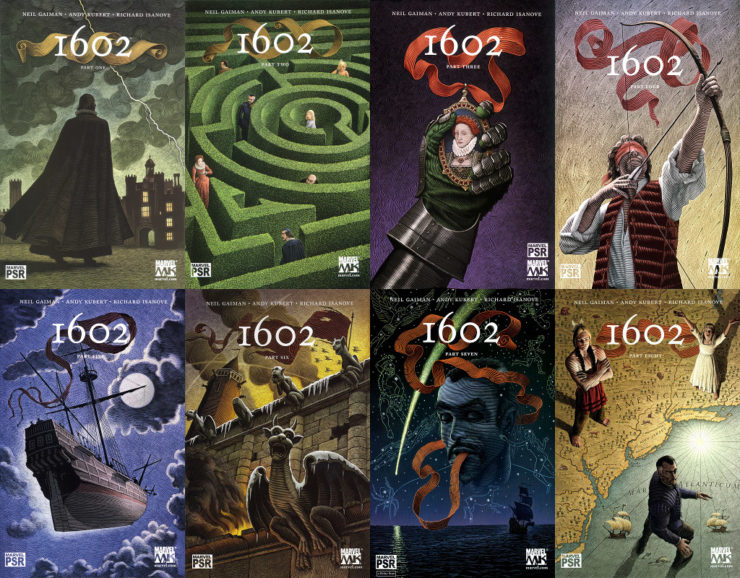Something we never expected from Avengers: Endgame was that it would perfectly set up an adaptation of Neil Gaiman’s very weird, very fun, 8-issue limited Marvel Comics series 1602.
Alas, this may not come to pass! On Wednesday, the author revealed in a tweet that Marvel’s television arm turned down his offer to bring Marvel 1602 to the small screen.
“I asked Marvel TV about me making 1602 last year, but they weren’t interested,” he wrote, answering a fan inquiry. “Such a pity.”
Such a pity, indeed. Because this would actually be the perfect time for Marvel to show 1602 on-screen, for Avengers: Endgame-related reasons. (Spoilers, obviously, ahead.)
I asked Marvel TV about me making 1602 last year, but they weren't interested. Such a pity. https://t.co/9LH7mxC5wa
— Neil Gaiman (@neilhimself) June 27, 2019
For the uninitiated, Marvel 1602 takes some familiar faces, like Nick Fury (that is, Sir Nicholas Fury), Dr. Strange, and Matt Murdock, and brings them all the way back to the titular year, imagining the Marvel Comics universe if it had started in the 17th century instead of the 20th. Enter historical-domain character Virginia Dare, the first English child born in the New World (as well as a shapeshifter), and her mysteriously blond and blue-eyed Native American companion, Rojhaz.
Neither character, as far as we know, exists in the Marvel Universe. UNTIL the second-to-last issue, when Rojhaz reveals himself to be Steve Rogers, aka Captain America, from a more grimdark present day. In his present day, there’s even more time-related shenanigans afoot, and his time-traveling to the 17th century inadvertently causes superheroes to show up around then.
How does Avengers: Endgame come anywhere near this? Well, in Endgame, Cap ends his time in the present day by time-traveling. A lot. We know for certain that he restores the Infinity Stones to their proper timelines and then ends up retiring in the past with Peggy. But for all we know, he could easily have done everything he did in 1602 during Endgame, because the story of 1602 resolves by Steve Rogers traveling back to his present day.
There’s more.
With the X-Men and the Fantastic Four being pivotal to the plot of 1602, and with Disney now holding the rights to these characters, it would make perfect sense for 1602 to enter the MCU right now as a follow-up to Endgame. (And it’s a great way to reboot/introduce those characters without having to worry about explaining the absence of mutants in the MCU.)
Of course, Marvel TV turning down a series doesn’t necessarily mean we’ll never see 1602 on screen. It could just be that it’s not the right fit for TV. That the story may be better served by a movie, or even trilogy of movies, in our future.










